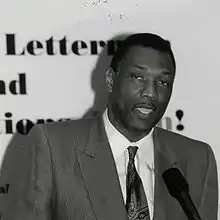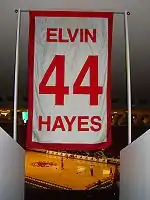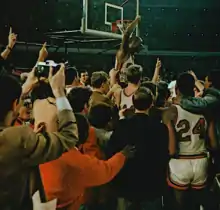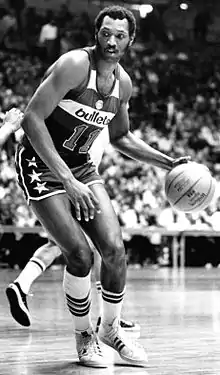Elvin Hayes
Elvin Ernest Hayes (born November 17, 1945), nicknamed "The Big E", is an American retired professional basketball player and radio analyst for his alma-mater Houston Cougars. He is a member of the NBA's 50th Anniversary All-Time Team, and an inductee in the Naismith Memorial Basketball Hall of Fame.
 | |
| Personal information | |
|---|---|
| Born | November 17, 1945 Rayville, Louisiana |
| Nationality | American |
| Listed height | 6 ft 9 in (206 cm) |
| Listed weight | 235 lb (107 kg) |
| Career information | |
| High school | Eula D. Britton (Rayville, Louisiana) |
| College | Houston (1965–1968) |
| NBA draft | 1968 / Round: 1 / Pick: 1st overall |
| Selected by the San Diego Rockets | |
| Playing career | 1968–1984 |
| Position | Power forward / Center |
| Number | 11, 44 |
| Career history | |
| 1968–1972 | San Diego / Houston Rockets |
| 1972–1981 | Baltimore / Capital / Washington Bullets |
| 1981–1984 | Houston Rockets |
| Career highlights and awards | |
| |
| Career statistics | |
| Points | 27,313 (21.0 ppg) |
| Rebounds | 16,279 (12.5 rpg) |
| Blocks | 1,171 (2.0 bpg) |
| Stats | |
| Stats at Basketball-Reference.com | |
| Basketball Hall of Fame as player | |
| College Basketball Hall of Fame Inducted in 2006 | |
College career

In 1966, Hayes led the Houston Cougars into the Western Regional semifinals of the 1966 NCAA Men's Division I Basketball Tournament before the Cougars lost to the Pac-8 champion Oregon State Beavers.
In 1967, Hayes led the Cougars to the Final Four of the 1967 NCAA Men's Division I Basketball Tournament. He would attempt 31 field goals, score 25 points, and get 24 rebounds in a 73–58 semifinal loss to the eventual champion UCLA Bruins featuring Lew Alcindor (now known as Kareem Abdul-Jabbar). Hayes' rebounding total is second to Bill Russell's Final Four record of 27.[1][2]
On January 20, 1968, Hayes and the Houston Cougars faced Alcindor and the UCLA Bruins in the first-ever nationally-televised regular-season college basketball game. In front of a record crowd of 52,693 fans at the Houston Astrodome, Hayes scored 39 points and had 15 rebounds while limiting Alcindor to just 15 points as Houston beat UCLA 71–69 to snap the Bruins' 47-game winning streak in what has been called the "Game of the Century". That game helped Hayes earn The Sporting News College Basketball Player of the Year.
In the rematch to the "Game of the Century", Hayes faced Alcindor and UCLA in the 1968 NCAA Men's Division I Basketball Tournament at the Los Angeles Memorial Sports Arena. UCLA coach John Wooden had the Bruins play a "triangle and two" zone defense with Alcindor playing behind Hayes and Lynn Shackleford fronting him. Hayes was held to 10 points, losing to Alcindor and the Bruins 101–69 in the semi-final game.[2]

Hayes led Houston in scoring in each of three seasons (1966: 27.2 points per game, 1967: 28.4, and 1968: 36.8). For his college career, Hayes averaged 31.0 points per game and 17.2 rebounds per game. He has the most rebounds in NCAA tournament history at 222. While a student at Houston, Hayes was initiated into the Alpha Nu Omega Chapter of the Iota Phi Theta fraternity alongside fellow future Hall of Famer Calvin Murphy.[3]
With his departure from college, Hayes was selected as the first overall selection in both the 1968 NBA draft and 1968 ABA draft. He was taken by the San Diego Rockets and the Houston Mavericks, respectively.
NBA career
San Diego/Houston Rockets
Hayes joined the NBA with the San Diego Rockets in 1968 and went on to lead the NBA in scoring with 28.4 points per game, averaged 17.1 rebounds per game, and was named to the NBA All-Rookie Team. Hayes' scoring average is the fifth best all-time for a rookie, and he remains the last rookie to lead the NBA in scoring average. He scored a career-high 54 points against the Detroit Pistons on November 11, 1968.
In Hayes' second season, he led the NBA in rebounding, becoming the first player other than Bill Russell or Wilt Chamberlain to lead the category since 1957 (Chamberlain was injured during much of the season). In Hayes' third season, 1970–71, he scored a career best 28.7 points per game. In 1971, the Rockets moved to Houston, enabling Hayes to play in the city of his college triumphs.
Baltimore/Capital/Washington Bullets

Hayes was acquired by the Baltimore Bullets from the Rockets for Jack Marin on June 23, 1972.[4]
Hayes and Unseld later led the Washington Bullets to three NBA Finals (1975, 1978 and 1979), and an NBA title over the Seattle SuperSonics in 1978. During the Bullets' championship season (1978), he averaged 21.8 points and 12.1 rebounds per game in 21 playoff games. Hayes set an NBA Finals record for most offensive rebounds in a game (11), in a May 27, 1979 game against the SuperSonics. The Chicago Bulls' Dennis Rodman would tie this record twice, both games coming in the 1996 NBA Finals, also against the SuperSonics.
Return to Rockets
Desiring to finish his playing career in Texas and preferably Houston, Hayes was sent back to the Rockets for second-round draft picks in 1981 (Charles Davis) and 1983 (Sidney Lowe) on June 8, 1981.[5][6]
After basketball
Shortly after finishing his career in the NBA, Hayes returned to the University of Houston to finish the last 30 credit hours of his undergraduate degree. When interviewed about the experience, Hayes mentioned, "I played 16 years of pro basketball, but this is the hardest thing I've ever done."[7]
In November 2007, Hayes became a City of Liberty Police Reserve Officer, fulfilling a childhood dream.[8] On November 22, 2010, it was announced that he would serve as an analyst for radio broadcasts of Houston Cougars games on Houston's KBME.[9]
Stats and honors
In his career with the San Diego/Houston Rockets and the Baltimore/Capital/Washington Bullets, Hayes played 1,303 games over 16 seasons, registering 27,313 points (ninth all-time) and 16,279 rebounds (fourth all-time). He is the all-time leading scorer for the Washington Bullets/Wizards. Hayes never missed more than two games in any of his 16 seasons in the NBA. In addition to his 1968 scoring title, he led the NBA in rebounding in 1970 and 1974. Hayes played in 12 straight NBA All-Star Games from 1969 to 1980. His total regular-season minutes played in the NBA were exactly 50,000.
Hayes was elected to the Naismith Memorial Basketball Hall of Fame in 1990 and named to the NBA's 50th Anniversary All-Time Team during the 1996–97 NBA season. He boycotted the Hall of Fame beginning in 1990 and refused to return until Guy Lewis, his coach at the University of Houston, was admitted.[10]
In 2003, Hayes was inducted into the Breitbard Hall of Fame, which honors San Diego's finest athletes.[11]
See also
NBA
- List of National Basketball Association players with 1000 games played
- List of National Basketball Association franchise career scoring leaders
- List of National Basketball Association career scoring leaders
- List of National Basketball Association career rebounding leaders
- List of National Basketball Association career blocks leaders
- List of National Basketball Association career free throw scoring leaders
- List of National Basketball Association career minutes played leaders
- List of National Basketball Association career playoff blocks leaders
- List of National Basketball Association players with most rebounds in a game
- List of National Basketball Association players with most blocks in a game
- List of individual National Basketball Association scoring leaders by season
- List of National Basketball Association annual minutes leaders
- List of National Basketball Association annual rebounding leaders
References
- NCAA Men's Basketball Final Four Individual and Team Records
- 2007–2008 UCLA Men's Basketball Media Guide – PDF copy available at www.uclabruins.com. pg. 61 Post Season Scoring Recaps
- "Archived copy". Archived from the original on February 13, 2015. Retrieved August 23, 2010.CS1 maint: archived copy as title (link)
- Beard, Gordon "Rockets Trade Elvin Hayes; Goes To Bullets For Jack Marin" Associated Press, Sunday, June 25, 1972
- Dupree, David & Richmond, Peter "Bullets Send Hayes to Rockets for Draft Choices" The Washington Post, Tuesday, June 9, 1981
- 1981 NBA Draft Pick Transactions – Pro Sports Transactions.
- Callahan, Tom (December 23, 1985). "Impressions in Black and White". Time Magazine. Retrieved February 22, 2009.
- Local basketball legend now a sheriff's deputy
- "Elvin Hayes to Join Men's Basketball Radio Broadcast Crew". Houston Cougars athletics. November 22, 2010. Retrieved November 23, 2010.
- "Guy Lewis waiting for Hall of Fame call". Archived from the original on March 16, 2014. Retrieved March 16, 2014.CS1 maint: bot: original URL status unknown (link)
- "Archived copy". Archived from the original on August 9, 2011. Retrieved June 23, 2009.CS1 maint: archived copy as title (link)
Further reading
- Heisler, Mark (2003). Giants: The 25 Greatest Centers of All Time. Chicago: Triumph Books. ISBN 1-57243-577-1.